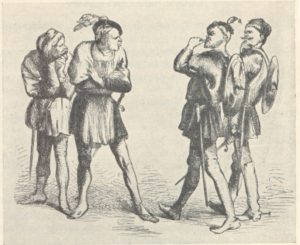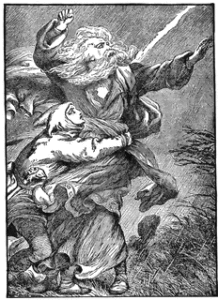 Without Tybalt, would there be a Romeo and Juliet? My preferred interpretation of the “ancient grudge” is that it’s on its dying days, if not for Tybalt single-handedly keeping it alive.
Without Tybalt, would there be a Romeo and Juliet? My preferred interpretation of the “ancient grudge” is that it’s on its dying days, if not for Tybalt single-handedly keeping it alive.
- The Prologue tells us, “from ancient grudge break to new mutiny.” I’ve always taken this to mean that during the play we will see the grudge reignited.
- Sure, the opening scene is a fight between Montagues and Capulets, but it’s also a comedy scene, isn’t it? None of the four (I just realized, Balthazar is in that scene but doesn’t appear to have any lines?) comes off as a genius. It’s all talk, and doesn’t turn into a fight until, you guessed it, Tybalt shows up. Tybalt’s not there, maybe they exchange some heated words and go on their way.
- Also worth pointing out here is that not only is the Montague (Benvolio) trying to stop the fight, he tries to reason with Tybalt to do the same. He doesn’t just attack Tybalt.
- Enter the heads of both families – both men wielding (or calling for) their swords, but both women holding them back and talking to them like they’re idiots for even thinking about it. Nobody assumes that either Lord Capulet or Lord Montague is going to join the fray, it’s just posturing to not show weakness in front of the other.
- So, maybe without Tybalt escalating this one, we don’t need the Prince to lay down the law because they’ve thrice disturbed the peace. Who knows, maybe it was Tybalt instigating it every time? The Prince wants to speak with Capulet first, so maybe he’s planning to say “Dude, what are you going to do about Tybalt? He’s the trouble maker here.”
- Next time we see Lord Capulet: “’tis not hard, I think, for men so old as we to keep the peace.”
- Then there’s the masquerade ball. Who calls out Romeo? Tybalt. Lord Capulet doesn’t care, and even yells at Tybalt for ruining the party. Imagine if Gregory or Sampson from the first scene was the one to bust Romeo. Lord Capulet says don’t worry about it, they say fine, they don’t worry about it. But because it’s Tybalt, we get what reminds me of the scene from Karate Kid II where the constipated uncle learns his lesson but the hot-headed nephew can’t get over losing his honor. “NOW……TO YOU……I AM DEAD!“
- Of course we know what comes next. Tybalt comes seeking Romeo to avenge the stain on his honor, and whether Mercutio drew first or not, the body count climbs and the rest is history. Very different from the Karate Kid II ending.
So, what’s your position on the grudge? If there was no Tybalt, would the story still play out the same? Somebody else would simply step into his shoes and, like any other sci-fi time travel story, whatever was destined to happen will still manage to happen? Or is the story really all about Tybalt?

 Anybody that knows me knows that when I see a post titled 1000 Most Mentioned Books on Reddit (or, really, anywhere), the first thing I’m going to do is search it to see where Shakespeare shows up. Any guesses?
Anybody that knows me knows that when I see a post titled 1000 Most Mentioned Books on Reddit (or, really, anywhere), the first thing I’m going to do is search it to see where Shakespeare shows up. Any guesses?
 ? I was wrong, it’s Hamlet.”
? I was wrong, it’s Hamlet.”